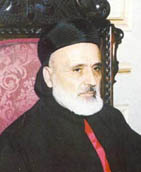 By Rita Daou A sleek official-looking convoy rolls up in front of Beirut’s Maronite patriarchate. No-one emerges. Seconds later a lone, humdrum jeep pops up. And out steps Lebanon’s Prime Minister Fuad Siniora.Such fake convoys are just one of the methods used by Lebanese politicians attempting to outwit potential attackers who have reportedly already compiled hit lists of their next targets.
By Rita Daou A sleek official-looking convoy rolls up in front of Beirut’s Maronite patriarchate. No-one emerges. Seconds later a lone, humdrum jeep pops up. And out steps Lebanon’s Prime Minister Fuad Siniora.Such fake convoys are just one of the methods used by Lebanese politicians attempting to outwit potential attackers who have reportedly already compiled hit lists of their next targets.
Even the most sophisticated equipment and armoured convoys have been incapable of preventing targeted assassinations against critics of Syria – the last being parliamentarian and press magnate Gibran Tueni a week ago."The rhythm of the attacks is scary. We hardly have the time to bury a martyr, before another one falls," said Maronite Catholic Cardinal Nasrallah Sfeir.
The 85-year-old cardinal, a vocal critic of Syria’s presence in Lebanon whose own name appeared on the alleged hit-lists, has also used similar dummy convoys and army helicopters for his movements.For some, the only option in a climate of fear that has seen 15 attacks and political killings since October 2004 last year has been to barricade themselves at remote mountain retreats or leave the country altogether.Figures critical of Syria’s role in Lebanon have adopted tight measures or stayed abroad like Saad Hariri, son and political heir to slain former prime minister Rafiq Hariri. Leader Michel Aoun has been also retreated to his villa in Rabiyeh, an exclusive residential hilltop overlooking the capital.Marcel Ghanem, a prominent LBCI talk-show star, said the channel had adopted security measures for homes as well as means of transportation and communication.
But even pro-Syrian figures, such as Sheikh Hassan Nasrallah, head of the Shi’a Muslim group Hezbollah, and Nabih Berri, the powerful parliament speaker and chief of the rival Shi’a Amal movement, have restricted their movements.
International pressure after the murder of former premier Rafiq Hariri in October led to the arrest of top security officials as well as the withdrawal of Syrian forces after nearly three decades in their tiny neighbour.
But as international and Lebanese investigators pursued the probe into Hariri’s killing, the bombing campaign continued.
Tueni was killed the morning after he arrived from Paris, where he had been staying for security reasons.
Powerful Druze leader MP Walid Jumblatt, long retrenched in his mountainous home southeast of Beirut, has warned of more attacks as "the objective is to kill enough MPs to make the country impossible to rule."
Samir Geagea, the head of the Christian Lebanese Forces party, has mostly remained in his private home in the Cedar mountains in northern Lebanon.
At Tueni’s funeral, Geagea arrived at the Greek Orthodox cathedral in downtown Beirut in a small, regular car closely followed by an army of bodyguards.
Even companies and malls have been hiring private security agencies.
"In general, cement blocks are placed around buildings and cars are prohibited from parking close by," the head of a security company who did not wish to be identified said.
"There is sophisticated equipment to catch explosive materials, but the assassinations are taking place outside secured premises," he added.
He noted that Hariri’s convoy had been secured with an extremely sophisticated jamming system and that Tueni’s car was an armoured vehicle.
"It did not prevent Hariri’s car from being blown up by remote-control, according to the report of the UN commission of inquiry.
"And it did not prevent Tueni’s car from being thrown into a ravine and being burned," he said.
Fear has also spread among journalists after the assassination of Tueni and An Nahar editorial writer Samir Kassir, as well as the bombing attack that maimed May Chidiac, a star newscaster for the leading LBCI television.
"I only use taxis, and I am still afraid. We are forced to be constantly on the move and we do not have any sophisticated protection system," one An Nahar journalist said on condition of anonymity.
"Everyone is a target," he said. – Sapa-AFP



